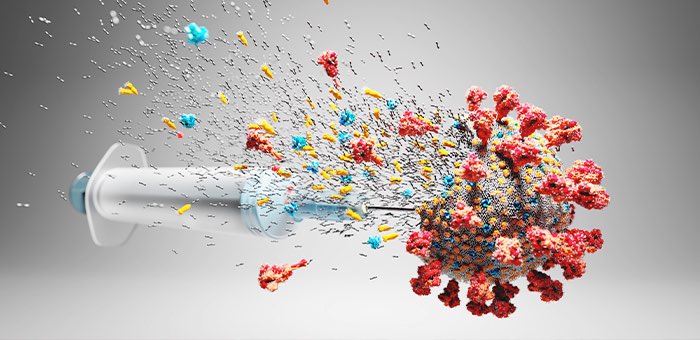In the Altai Republic, 632 people have already received two components of the Sputnik V vaccine, another 1,870 people received the first component of the vaccine. Now everyone can get vaccinated, you can pre-register through the portal of the State Services or through the clinics.
The region has received 4,042 doses of the two-component vaccine to vaccinate the adult population, with several thousand more doses expected shortly.
Despite the fact that vaccination against coronavirus is in full swing, not everyone knows how vaccination works and how to behave before and after vaccination, and therefore they are in no hurry to get vaccinated. In this regard, the department of Rospotrebnadzor published an analysis of myths about vaccination. We bring this information to your attention.
Myth. Before vaccination, you need to be tested for antibodies to coronavirus.
In fact. It doesn’t make much sense. The presence of antibodies does not interfere with the action of the vaccine in any way. Even if you have had a coronavirus and you have antibodies, after vaccination their number will increase and the protection will become more reliable.
Myth. Those who have been ill do not need to be vaccinated.
In fact. Even those who have already had a coronavirus infection should not refuse vaccination. Over time, the number of antibodies to the virus decreases, there is a risk of re-infection. In addition, it is still unknown how many antibodies provide reliable protection against the virus. Therefore, it will not be superfluous to insure and provide more powerful immunity.
Myth. After the first stage of vaccination, immunity decreases and the risk of contracting Covid-19 increases.
In fact. This is not true. Antibodies to coronavirus infection appear already a few days after the first stage of vaccination. Another thing is that they may not be enough for the protection to be completely reliable. Therefore, the risk of contracting coronavirus exists between the first and second stages, but it is not higher than before vaccination. However, this does not mean that you do not need to take precautions between the first and second vaccinations.
Myth. Elevated body temperature after vaccination is dangerous.
In fact. This reaction is completely normal. The Sputnik V vaccine is a vector vaccine. The essence of the technology is that in order to obtain it, scientists take an adenovirus that is deprived of the ability to multiply. A piece of RNA with information about the coronavirus protein (S-protein) is “inserted” inside the adenovirus, which the immune system needs to “get to know” in order to develop protective antibodies. That is, the adenovirus acts as a “vehicle” to which the S-protein of the coronavirus is “attached”. Fever and malaise are just the body’s response to a meeting with the adenovirus. Such symptoms do not occur in everyone, and if they do, they usually disappear within a few days, since due to the lack of genes for reproduction, the adenovirus is unable to cause a real disease.
Myth. If the temperature rises after vaccination, it cannot be brought down, otherwise immunity will not develop.
In fact. Temperature is just one indication that the body has reacted to the meeting with the adenovirus. The numbers on the thermometer do not affect the development of immunity to coronavirus. Therefore, if you feel unwell, you can take your usual antipyretic agent.
Myth. If a person is immune to adenovirus, the vaccine will not work, as the body will deal with the vector too quickly and will not have time to develop protection against Covid-19.
In fact. Such fears really were among the creators of the vaccine. This is one of the reasons why vaccination is carried out in two stages. For the manufacture of the first and second components of the vaccine, different adenoviruses are used (serotypes 26 and 5) and the likelihood that at the time of vaccination a person has a high titer of antibodies to both types of adenovirus is negligible, because immunity to adenoviruses is unstable.
Myth. Before vaccination, you need to pass a coronavirus test to rule out an asymptomatic disease.
In fact. It’s not obligatory. Vaccination during the asymptomatic course of coronavirus infection will not harm health, but the benefits of it are obvious. The fact is that with an asymptomatic form of the disease, the body, as a rule, produces a minimum amount of antibodies to Covid-19, so the risk of re-infection in such patients is very high. Vaccination will eliminate this risk.
Myth. Do not drink alcohol after vaccination, otherwise the vaccine will not work.
In fact. The vaccine will work anyway. But when immune reactions occur in the body, it becomes especially susceptible to various harmful influences. Therefore, after vaccination, even small doses of alcohol can cause poisoning, liver and pancreas problems. For the same reason, exercise, hypothermia, baths and saunas should be avoided for a few days after vaccination.
Myth. People with chronic diseases and the elderly should not be vaccinated.
In fact. Since such people have a particularly high risk of a severe course of coronavirus infection, vaccination is vital for them. The only condition is that you need to be vaccinated without an exacerbation of a chronic disease. And of course, before getting vaccinated, it is better to contact your doctor. To reduce the manifestations of post-vaccination reactions, weakened patients are often prescribed anti-inflammatory drugs a few days before and after vaccination, asthmatics increase the dose of inhalation drugs, diabetics are advised to more closely monitor blood sugar levels, hypertensive patients are prescribed additional drugs for a short time to lower blood pressure. The scheme of preventive measures depends on the underlying disease.
Myth. It is not necessary to wear a mask after vaccination.
In fact. Vaccination is not a 100% guarantee that you will not get the coronavirus. Another thing is that in vaccinated people, coronavirus infection occurs in a mild or asymptomatic form. And such a person, without knowing it, can infect others. And if so, you still have to wear a mask.
Myth. Vaccination does not protect against mutated coronavirus – British, Brazilian or South African strains.
In fact. The existing mutations of the coronavirus are insignificant, so the vaccine protects against all known strains of Covid-19.
– .


